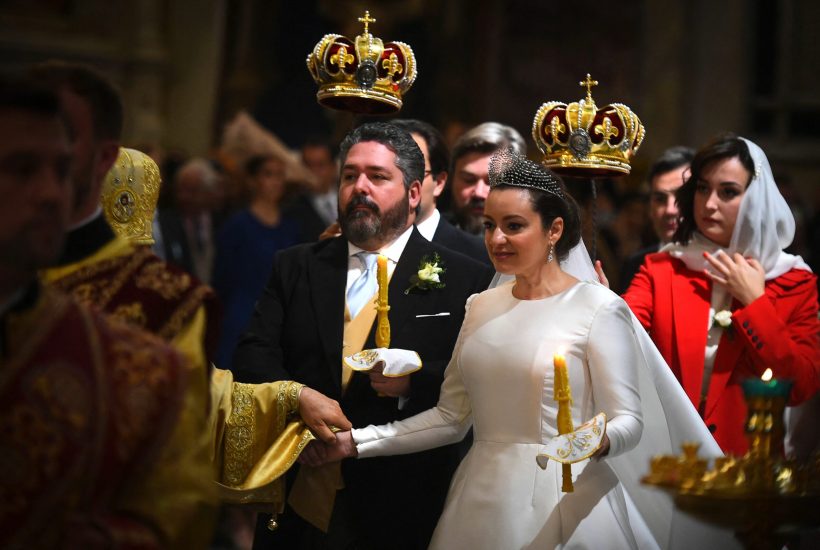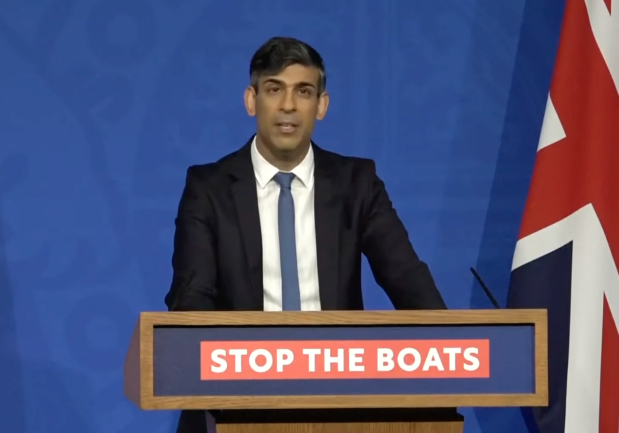Hail the tsar! Georgy Romanov, great-grandson of Grand Duke Kirill, cousin to Nicholas II, the ill-fated final Emperor of Russia, is Grand Duke and Sovereign Heir to the throne — at least according to some. He has just wed Italian consultant and author Rebecca Bettarini in the first royal wedding in St Petersburg for over a century.
It was an over-the-top, three day event that brought together not only the scattered scions of Europe’s intermarried royal families, from Queen Sofia of Spain to Simeon II of Bulgaria, but also figures from the new Russian elite. The 1,500 guests included multi-millionaire Konstantin Malofeyev, owner of the nationalist TV channel Tsargrad, who is under international sanctions for his reported role in bankrolling insurgents in Crimea and the Donbas.
Even the food represented a genuflection to the new nobility; catering was provided by ‘Putin’s chef’ Yevgeny Prigozhin, who is also under sanctions for combining his catering business with a disinformation ‘troll farms’ and a mercenary army.
 (Getty)
(Getty)
On one level, the wedding was just an indulgent spectacle, a glitteringly gaudy celebration of pomposity. Furs, diamonds, medals and tiaras were the order of the day. Ultimately, though, it was meaningless. Ever since Nicholas II abdicated in March 1917, his dynasty has been a spent force. The subsequent murder of his entire family by the Bolsheviks in 1918 simply represented a particularly bloody full stop to his abdication statement.
Whatever the hopes kindled by some of the surviving aristocratic diaspora, the Romanovs are not returning to the throne any time soon. Only 3 per cent of Russians want to return to the feudal days of old tsarism. Yet support for a constitutional monarch, devoid of the powers of the old emperor, is about equal to those who remain opposed to any form of monarchy.
In any case, the tail is now wagging the dog. In the empire, the Russian Orthodox Church accepted its role as cheerleaders of the tsars, offering legitimation in return for privilege. Now, the Romanovs have largely been co-opted by a Church that is seeking both to justify its renewed status and control how the country’s history is reassessed.
Nicholas II, his wife Alexandra and his children were canonised in 2000. The tsar was dubbed ‘Saint Nicholas the Passion-Bearer’ for bearing his fate with ‘humility, patience, and meekness’, perhaps because little better could be said about a man who so manifestly failed to live up to the exigent demands of his time. Nonetheless, the Church has effectively turned the dynasty into part of its own story.
Besides, if anyone were to be monarch, there may be other contenders — and not just other Romanovs. In 2016, ultra-nationalist politician Vladimir Zhirinovsky argued that Vladimir Putin ought to be crowned tsar. Malofeyev, Tsargrad’s owner and the Romanov’s wedding guest, has since said the same. Although there is no hint that the president really is contemplating such an elevation, many feel that in practice his power is effectively monarchical.
 (Getty)
(Getty)
In this respect, the hankering after monarchy — not just in Russia — represents wider dissatisfactions with the modern world. The crown means stability, tradition, national unity, duty and honour, all characteristics frequently felt lacking today. It is notable that in Britain the civil service and the military swear allegiance not to the inhabitant of No. 10 Downing Street — Boris Johnson is certainly no commander-in-chief — but to the Crown. Monarchy is the living permanence at the heart of the British constitution. Less intangibly, at a time when democracies seem vulnerable to corruption and hyper-partisanship, it is tempting to see salvation in an idealised executive who can ignore the grubby realities of professional politics.
For all the talk of greater Romanov involvement in Russian public life, the Kremlin remains the sole source of political power. After all, it was a fitting metaphor that the elaborate church celebration, with all the usual trappings of an Orthodox wedding, from battalions of priests to the oversized crowns that friends of the couple took turns to hold above their heads, it was actually not a legal ceremony. The couple had their moment of pomp in St Isaac’s Cathedral, but to get married, to have the right to exchange those Faberge rings, they had first to go to the Khamovmiki district registry office in Moscow like any other commoner. The state will always have its way.
Got something to add? Join the discussion and comment below.
Get 10 issues for just $10
Subscribe to The Spectator Australia today for the next 10 magazine issues, plus full online access, for just $10.




















Comments
Don't miss out
Join the conversation with other Spectator Australia readers. Subscribe to leave a comment.
SUBSCRIBEAlready a subscriber? Log in